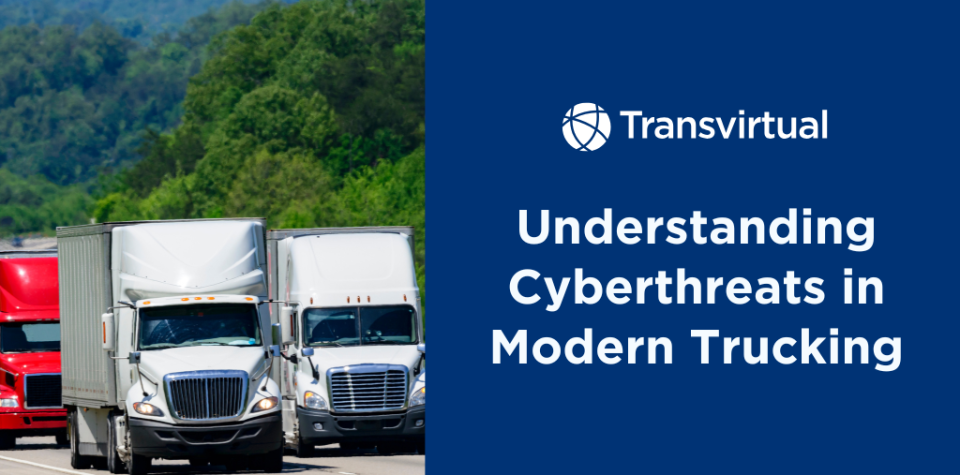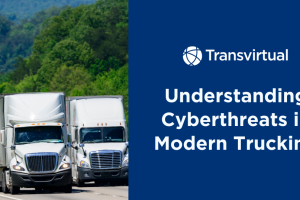Table of Contents
Connected vehicles are a defining feature of modern transportation, especially within the transportation sector. Today’s fleets use telematics, GPS, Electronic Logging Devices (ELDs), and smart fleet platforms—technologies that share real-time data. These tools boost efficiency, route planning, maintenance, and safety. But that connectivity also opens doors for cybercriminals.
Each device and network link becomes a potential entry point. One industry article notes that every device can be a gateway for hackers to infiltrate your system, illustrating the risks that come hand in hand with innovation. The trucking industry is a prime target for cybercriminals due to its reliance on interconnected transportation systems and critical infrastructure.
Cybersecurity in trucking isn’t just about IT. It’s also about keeping your operations running smoothly, your assets safe, and your business thriving. Cyberattacks on trucking can have ripple effects across the global supply chain, impacting vital services and economic stability.
The Price of Cyberattacks on Trucking and Transportation
The transportation industry, more broadly, faces significant losses: the average cost of a data breach in the transport sector is approximately $3.98 million. Such incidents can have a ripple effect on the broader economy, leading to increased costs, supply chain issues, and impacts on public safety. When a trucking or logistics company is hit by a cyberattack, the price tag can be enormous and far beyond the ransom demand, causing major disruption to operations and finances. In some cases, the disruption of critical trucking operations can result in catastrophic consequences, affecting essential services and daily life.
Financial Losses
Downtime
When critical systems go offline, trucks can’t be dispatched, routes get delayed, and deliveries pile up. This disrupts trucking operations and can result in significant financial losses. Maintaining timely deliveries is crucial to prevent supply chain delays and avoid further economic consequences. That lost operating time eats directly into revenue.
Ransom payments and IT costs
Even if the ransom is paid, companies must also pay cybersecurity experts, legal fees, and forensic investigations. Cyberattacks can also impact essential services provided by trucking companies, further increasing operational costs.
Insurance and compliance costs
Higher insurance premiums, audit costs, and potential fines all factor in when regulation or transit contracts demand strict data protection.
Reputational Damage and Regulatory Penalties
Clients and partners expect reliability. A public breach can erode trust, and customers may choose competitors.
In regulated contexts (e.g., freight with sensitive cargo or international shipments), breaches may bring penalties under data protection laws or contractual penalties. Maintaining regulatory compliance is essential to avoid such penalties and ensure adherence to industry standards.
Hidden Costs
Business continuity is greatly affected. It can take weeks or even months to fully restore systems and operations. Even after systems are back online, ensuring that data is correct, clean, secure, and that nothing malicious remains—including verifying the integrity and security of critical data—can take extensive effort and expense.
It might also lead to a loss of customer trust. Lost confidence may lead to canceled contracts or fewer repeat clients.
Types of Cybersecurity Threats in Trucking
The trucking industry’s growing reliance on connected systems has created new opportunities for cybercriminals. Common types of cyberattacks targeting the trucking industry include malware, ransomware, and phishing. These cyber threats not only impact trucking but also affect other sectors within the transportation industry, highlighting the interconnected risks across the entire sector. Below are the most common threats fleets face today, and how each one can disrupt operations.
Ransomware Attacks
A ransomware attack is one of the most damaging threats to transport operators. Attackers lock access to critical data in dispatch systems or fleet databases and issue ransom demands, requiring payment to restore access. In 2020, U.S.-based Forward Air experienced such a ransomware attack that halted operations and cost them US $7.5 million in revenue loss. Ransomware incidents often spread fast through shared networks, impacting multiple departments.
Phishing Attacks
Phishing remains one of the easiest ways for hackers to break in. A fake invoice, login notice, or email from a “supplier” might convince a staff member to click a malicious link or enter credentials. Attackers use phishing to gain unauthorized access to company systems and sensitive data. Because trucking relies heavily on fast communication and paperwork, these schemes often go unnoticed until it’s too late.
Insider Threats
Sometimes the risk comes from within. Employees or contractors with legitimate access can accidentally or intentionally leak sensitive data, including sensitive information that can be exploited by attackers. Poor password hygiene or sharing login details between drivers and dispatchers makes this threat more common than most fleets realize.
Data Breaches
Fleets collect massive amounts of personal and operational data like driver records, GPS routes, and client details. Weak passwords or outdated systems make this data vulnerable to theft, which can lead to financial loss and regulatory penalties. Attackers often exploit vulnerabilities in these weak points to gain access to valuable data.
Denial-of-Service (DoS) Attacks
DoS or DDoS attacks overwhelm fleet servers with traffic, knocking dispatch or routing systems offline. Even short disruptions can delay shipments and hurt customer satisfaction. Similar DoS attacks can severely disrupt mass transit systems, leading to broader operational challenges.
Supply Chain Vulnerabilities
Many fleets rely on third-party logistics providers and integrated apps. The shipping sector, as a critical part of the supply chain, is particularly vulnerable to cybersecurity breaches, which can have widespread effects. If a vendor’s software is compromised, attackers can access connected fleet systems. Vetting partners and requiring strong cybersecurity standards helps prevent this weak-link exposure.
How to Keep Your Fleet Safe from Cyberattacks
Cybersecurity in trucking isn’t about complicated tech. All it takes is to build habits that protect your people, systems, and freight. Every fleet, no matter its size, can take simple steps to stay safe. Implementing cybersecurity solutions and tailored solutions designed for the transportation industry is crucial to address sector-specific threats. These measures help strengthen overall cyber defenses for trucking fleets.
Employee Training
Your first line of defense is your team. Train dispatchers, drivers, and office staff to recognize phishing emails, suspicious links, and social engineering tactics. A quick check before clicking can stop a full-scale breach. Make cybersecurity awareness part of onboarding and hold short refresher sessions regularly.
Regular Software Updates
Cybercriminals often exploit outdated software. Keep telematics systems, ELDs, GPS units, and management software updated. Turn on automatic updates wherever possible to close security gaps before attackers find them. Many modern security solutions also leverage artificial intelligence for advanced malware detection and behavioral threat analysis, further enhancing protection against cyber threats.
Multi-Factor Authentication (MFA)
Passwords alone aren’t enough anymore. Enable MFA across dispatch systems, email, and any software that holds sensitive data. A second verification step, like a text or app prompt, can block most unauthorized access attempts.
Secure Networks
Always use encrypted Wi-Fi connections and strong firewalls in offices and depots. For mobile workers, consider using VPNs to keep remote logins private and protected. Public or unsecured networks can easily expose credentials or live fleet data. Attackers can exploit these weaknesses for accessing sensitive fleet data and control systems, increasing the risk of unauthorized entry into critical functions.
Data Backups
Regular, off-site backups can save your business in the event of ransomware. Back up dispatch records, customer files, and route data daily, and test recovery systems often. A quick restore means your fleet can get back on the road even if systems are hit.
Incident Response Plan
When an attack happens, panic slows recovery. A clear response plan, who to contact, how to isolate affected systems, and how to alert customers, helps minimize downtime. Everyone on your team should know their role when a breach is suspected.
Vendor Security Checks
Your partners’ weaknesses can become your vulnerabilities. Before connecting software or sharing data, confirm that third-party logistics systems and technology providers follow strong cybersecurity protocols and compliance standards. Transportation organizations must also ensure their partners adhere to robust cybersecurity standards to protect critical infrastructure and maintain operational continuity.
Professional Audits
Schedule annual cybersecurity audits to test your defenses. A professional audit is a leading practice for identifying and addressing cybersecurity weaknesses, as experts can spot issues you might miss and recommend fixes before attackers exploit them.
Protecting the Road Ahead
Cybersecurity is now as essential to fleet safety as fuel and maintenance, especially within the trucking industry and for trucking companies operating commercial vehicles and other commercial vehicles. Every connected vehicle and its control systems introduce both opportunity and risk, making transportation cybersecurity a business priority, not an afterthought. A single breach can halt deliveries, disrupt critical services, threaten public safety, and impact daily life by affecting transportation infrastructure and the broader industries, including aviation and other sectors reliant on secure operations. Truck manufacturers play a key role in implementing security by design, while ongoing vigilance is needed to address future threats and ensure operational resilience across all transportation services.
Transvirtual delivers a Transportation Management System that keeps your data secure and your business running without interruption. It combines reliability, transparency, and protection in one platform. Staying secure means staying competitive, and Transvirtual helps your fleet do both, safely, efficiently, and confidently.


